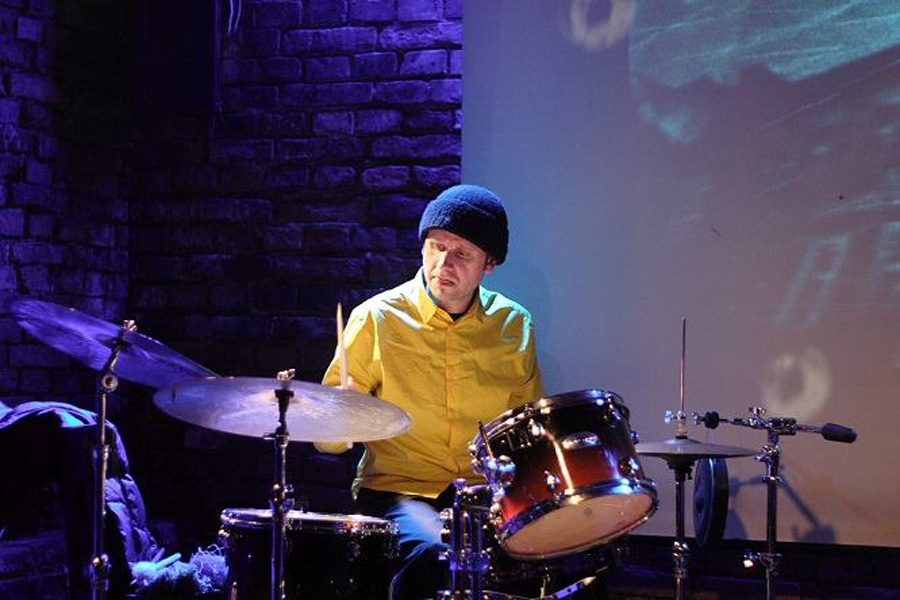Evanston librarian hosts podcast featuring Chicago-area musicians
Source: Tim Daisy on WordPress
Tim Daisy improvises with percussion. Daisy is an experimental musician who was recently featured on “Now Is Podcast.”
October 19, 2016
A&E
The origin story of “Now Is Podcast” is simple: “I like projects, and I don’t have any children,” host Ben Remsen said. “It seemed like a fun thing to do.”
Remsen, the adult services librarian and event organizer at Evanston Public Library, said he drew from his longtime interest in improvisational music to create “Now Is Podcast,” a monthly show that consists of hourlong conversations with artists about music. The podcast focuses on different styles of contemporary jazz and creative music, or any music genre that involves some element of improvisation, Remsen said.
For each podcast episode, Remsen plays selections of music related to his guests’ work and has them talk about what they hear. He said this prompts the artists to speak in meaningful and reactive ways without the need for pre-scripted commentary.
The recording sessions are specifically designed to be laid-back, Remsen said, and most of the podcasts are recorded in his living room. He stressed the importance of being not “doctrinaire” when approaching these discussions in order to move beyond strict music analysis.
“I don’t want it to have that sense of high pressure to say something smart all the time,” Remsen said. “I like the idea of it just being a few people sitting around and chatting about music.”
Recent podcast guest Tim Daisy said his experience on the podcast was comfortable and positive. Daisy, a Chicago drummer and composer, said Remsen’s familiarity with creative music helped stimulate a thoughtful conversation on the genre.
Daisy said he is not strictly limited to one genre, and all his performances include elements of improvisation, which are features Remsen looks for in his guests.
“I’m interested in an art form where, when I begin something and I set a process in motion, I’m not sure what the results are going to be,” Daisy said.
The show began as an “insider hobby,” Remsen said, meaning his goal in producing the podcast was not to build an audience base. However, he said he hopes the podcast will help dispose of the false idea that jazz is no longer relevant.
“I’m happy for anyone listening to it to get a little bit of access into this extraordinarily thriving, extremely niche world of this kind of music,” Remsen said.
Lesley Williams, head of adult services at EPL, said Remsen’s enthusiasm for different art forms plays a role in his day job as well. He organizes various cultural events including “Book Reports for Grown-Ups” and graphic novel discussions held in a comic book store, and has recently been coordinating a jazz show that will be held at the end of the month.
“The role of the library is to try to democratize all forms of intellectual endeavor, whether it’s visual arts, music or literary arts,” Williams said.
Williams said podcasting is a fitting medium for this endeavor because the episodes are widely available. She described “Now Is Podcast” as an accessible program, even for those who, like herself, lack expertise in music.
“Now Is Podcast” almost exclusively features artists from the Chicago area, Remsen said. The city has a long history of improvisational music, including the formation of the Association for the Advancement of Creative Musicians in the 1960s.
Although most of the artists Remsen interviews are of a “significantly younger generation” than in the historic Chicago improvisation scene, he said they have becoming a part of this longstanding cultural tradition. Daisy, who tours internationally, said the city’s creative music scene is recognized by artists worldwide.
Remsen believes this is the case because Chicago has the resources of a major city without the need to “hustle incredibly hard.” Compared to a place like New York City, Chicago is cheaper and more low-pressure, which can creativity, he said.
Daisy said the “collaborative spirit” in Chicago was also a factor, resulting in a “pollination” of ideas between different musical genres.
“Chicago has always had a D.I.Y. culture built into its framework,” Daisy said. “It’s that attitude of openness that has helped make Chicago really strong.”
Email: [email protected]
Twitter: @madsburk


